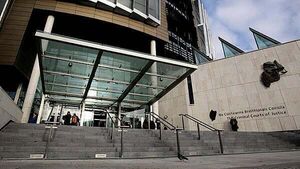Financial advisor jailed for losing €2m of investors' funds in unauthorised transactions

Eimear Dodd
A financial advisor who lost around €2 million of property investors' funds in unauthorised stock market transactions has been jailed for six years.
William Kiely (52) went on trial at Dublin Circuit Criminal Court earlier this year, but changed his plea to guilty on the 21st day of the trial when he pleaded to three counts of dishonestly appropriating money from the accounts of Barrington Capital Ltd between 2007 and 2010. The court heard the theft involved $1.47 million and around €700,000.
Kiely, of Richmond Avenue, Dartry, Dublin 6, also pleaded guilty to knowingly carrying on the business of a company, Barrington Capital Limited, with intent to defraud creditors between July 2008 and February 2010.
Kiely further pleaded guilty to falsifying a financial statement on March 12th, 2010. He has no previous convictions.
The court heard Kiely set up a legitimate investment vehicle, Barrington Capital Ltd, to purchase commercial property in the United States. After the 2008 global financial crash, he did not return all of the money which had been intended to purchase property, but instead used some of it – without investor authorisation - on the stock market, which was ultimately unsuccessful.
Having heard the facts of the case, Judge Elma Sheahan today/yesterday (FRIDAY) said Kiely had a high degree of culpability and the harm caused to the injured parties was significant.
Kiely was handed a six year sentence and has also been automatically disqualified from serving as a director of a company for five years.
The judge said the number of investors involved, the financial losses they suffered and the impact on their emotional wellbeing and peace of mind were among the aggravating factors, along with the period of time over which the offending occurred.
One investor read his victim impact statement to the court, outlining how he invested €50,000 in 2007 in what appeared to be a good investment opportunity.
He described his efforts to contact Kiely and get his money returned after 2011, as a “nightmare chapter of my life”.
He said he not only suffered the loss of €50,000, but also the opportunity costs over the last 17 years after it was not returned to him.
He said he had “waited a long time for this day”, but now has the answers and closure he needed.
None of the affected investors have received any money back, the court heard.
Detective Garda Ivor Scully told Dominic McGinn SC, prosecuting, that Kiely was operating as a financial advisor at the time, and went into partnership with two American experts.
There was an initial target of $20 million US dollars, with $5 million raised in the first stage, which was transferred to America with the intention of buying commercial property.
While enquiries were made about different properties, no purchase was made. After the global financial crash in 2008, the American experts recommended that money should be repaid to individual investors, and the money was returned to Ireland.
The court heard that while there had been some expenses, there was still more than €5 million in the investment pot at this point.
However, Kiely didn't immediately return the money to investors and instead, began to repurpose the funds. He transferred various amounts into an account in his own name, then into an account for trading on the stock market.
At the same time, Kiely told investors he intended to pivot the investment structure, but didn't outline this in detail except to say it would be connected to an American share index.
Many investors indicated they were not interested and their money – in excess of €3 million – was returned.
Others said they were open to the pivot, but wanted more information. Other investors asked for their money back, while some others didn't respond within a certain timeframe.
Kiely indicated no action would be taken without a formal vote on the new process, but had already transferred money into a trading account in his name.
Det Gda Scully told the court that these stock market investments were initially successful, but began to lose money at an alarming rate over a two-year period. Most of the $1.47 million US dollars was lost on the stock market, with this trading not authorised by the affected investors.
Kiely periodically updated investors, reassuring them that their funds were safe, that the investment scheme was still in its infancy and efforts were underway to improve the situation.
Many investors became concerned and asked for their money back. He contacted many of them saying their investment was still safe, but that the process of repaying the money would take time.
He said he was in the process of winding up the fund, and gave dates when money would be returned. However, there was no indication on the financial documents that he was doing anything to wind up the fund, and towards the end of the period, there wasn't enough money to pay back investors.
Just under €200,000 left in the trading account was transferred to Kiely's personal accounts. He stopped communicating with investors and effectively disappeared, the court was told.
Most of the transfers made were through Kiely's personal account, but some went into an account in name of Barrington Capital Ltd, a company operated by him.
The court heard that much of the funds went towards lifestyle expenses unrelated to the business and Kiely also paid himself an amount each month.
Between July 2007 and February 2010, Kiely was operating the company for a fraudulent purpose, the court heard.
Falsified statement
Kiely also falsified a financial statement in March 2010, which set out expenses on the account and what was left, however, at this point the funds were completely depleted.
The court was told this statement was false, and designed to reassure investors about the security of their investment.
Kathleen Leader SC, defending, asked the court to take into account that Kiely was a man of previous good character and to consider his guilty pleas as an acknowledgement of responsibility.
“He acknowledges these people trusted him and he is very sorry that things worked out as they did. All of this bears very heavily on him,” she said.
She said this was “not a thought out action” intended to defraud investors, but events overtook the original plan and Kiely's response has borne heavily on him since.
Her client has suffered significant mental health issues since 2011, with medical reports handed to the court.
Ms Leader suggested his diagnosis of anxiety and depression showed he was not “callous” and had not continued on as if nothing had happened.
Originally from Co Tipperary, Kiely is currently caring for his mother, who has vascular dementia.
The judge said she had taken into consideration the mitigation and Kiely's personal circumstances, including the impact on his family while he is in custody.
Det Gda Scully told the court he had seen various reports to be submitted on Kiely's behalf and accepted that the defendant was suffering from anxiety and depression in 2011 and 2012. He added that Kiely continued to pay himself until 2012 and sought professional help “using money that did not belong to him”.
Det Gda Scully agreed with Ms Leader, defending, that Kiely had expertise and a long work history in the financial services industry before Barrington Capital was set up.
It was also accepted that Barrington Capital was set up as a genuine investment vehicle, following careful planning with appropriate contact made with relevant experts.
Det Gda Scully said “the whole mechanism was bona fide” initially and one of the American experts who gave evidence during the trial described Kiely as ambitious, clever and hardworking.
It was further accepted that when there were significant costs involved in setting up the venture, with Det Gda Scully noting these would have been factored in at the planning stage.
The garda also agreed that the financial crash was beyond Kiely's control, and that over €3 million was returned to investors.
Det Scully noted that Kiely wrote to investors when the plan to invest in American commercial property didn't work out, adding that the defendant told them that he was looking at options, even though the American experts had recommended that the money should be returned.
It was also accepted that there was little money left after the trading on the stock market and that Kiely does not display an extravagant lifestyle.
Several victim impact statements were read to the court by Morgan Shelley BL, prosecuting. They outlined the financial cost of the loss of their money, and the effect it had on their lives, including a loss of trust in others.
One small business owner said while people think financial crime is victimless, the €50,000 she invested was a large amount for her as self-employed person and its loss left her significantly out of pocket.
Ms Leader told the court that Kiely has a long work history in financial services. He worked for Cantor Fitzgerald between 2016 and 2021, but had to leave his role due to the publicity surrounding this case.
She asked the court to take into account that over €3 million were returned to investors and the majority of the remainder didn't go into Kiely's pocket, but was lost on the stock market.
Her client is not currently working and has been caring for his mother. His caring role will fall on other members of his family while he is in custody, Ms Leader noted.
Two references were handed to the court, along with letters in relation to Kiely's mother's health.



